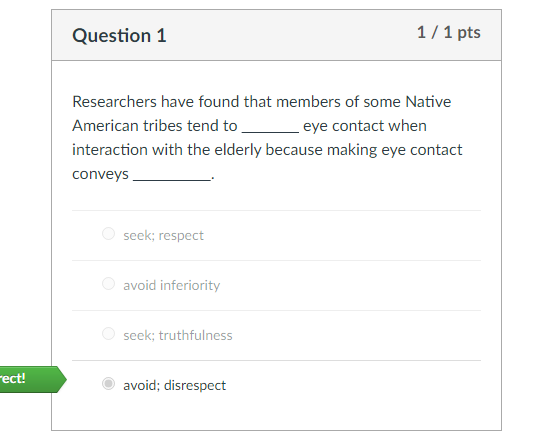Social Psychology-PSYC-101
Social Psychology
Question 1
Researchers have found that members of some Native American tribes tend to eye contact when interaction with the elderly because making eye contact conveys .
seek; respect
avoid inferiority
avoid inferiority
seek; truthfulness
avoid; disrespect
Question 2
When Larry forgets to buy milk at the grocery store, he says, “I forgot milk because I was thinking about picking my daughter up from school.” When Larry’s wife forgets to buy milk, Larry says, “She forgot milk at the store because she is an airhead.” This is an example of:
deindividuation
ingroup/outgroup bias
ingroup/outgroup bias
just world hypothesis
actor/observer bias
Question 3
Gamiel and Aliyah go out to eat, and Gamiel does not leave a tip for the waiter. If Aliyah explains Gamiel’s behavior by saying that he is frugal, she is making a attribution. If Aliyah explains his behavior by saying the service was terrible, she is making a attribution.
situational; situational
dispositional; dispositional
dispositional; dispositional
dispositional; situational
situational; dispositional
Question 4
It is not uncommon for us to hold stereotypes toward people. The main advantage of forming a stereotype is that it . The main disadvantage is that it is a mental shortcut; can be changed easily
is often an accurate judgment; is not very comprehensive
allows for rapid mental processing; can potentially lead to errors
identifies critical information accurately; is a mental shortcut
Question 5
Before taking an exam, Dion, who is a student athlete, overhears someone saying that student athletes always do poorly when it comes to academics because their sports commitments leave them no time to study. His anxiety increases and his confidence drops. This is an example of:
ingroup bias
stereotype threat
perspective taking
discrimination
Question 6
Selena thinks that all computer programmers are antisocial and boring. Even before meeting Mark, a computer programmer, Selena decides that she will not like him. Selena’s beliefs are , and not liking Mark is .
discrimination; prejudice
a stereotype; prejudice
a self-fulfilling prophecy; a stereotype
a self-fulfilling prophecy; discrimination
Question 7
1 / 1 pts
John and Nolan are huge fans of the New York Knicks basketball team, whereas Brad is a fan of the Brooklyn Nets. Which of the following is John most likely to do?
he will favor Brad because Brad belongs to the outgroup
he will be hostile to Brad because of discrimination
he will be hostile to Brad because of discrimination
he will like Nolan and Brad equally because of stereotypes
he will favor Nolan because Nolan belongs to the ingroup
Question 8
On the advice of social psychologists, a technology company decides to pay an unreasonable amount of money to a well-liked celebrity to promote a new product. The company is taking the route of persuasion and using conditioning to make potential customers develop a positive attitude about the product.
central; operant
peripheral; classical
peripheral; classical
central; classical
peripheral; operant
Question 9
Observations on how attitudes about African Americans would affect people’s willingness to vote for Barack Obama in 2008 revealed that people who reported low levels of prejudice but whose scores on the Implicit Association Test (IAT) indicated negative attitudes about Black people were likely to vote for Obama because attitudes were better predictors of behavior than attitudes.
more; implicit; explicit
less; implicit; explicit
less; explicit; implicit
more; explicit; implicit
Question 10
Casey eats a lot of junk food. She knows the negative consequences of her diet, but she rationalizes her behavior by saying junk food helps her deal with her anxiety. Casey is using this explanation because she is uncomfortable with the inconsistency between her behavior and her beliefs. Which of the following principles explains Casey’s explanation the best?
simple attitudes
cognitive dissonance
cognitive dissonance
implicit attitudes
attitude accessibility
Question 11
Two women, Jackie and Roberta, ask Katie out. Although Katie likes both of them, she decides to go out with Jackie. Afterward she starts to notice more positive qualities about Jackie and more negative qualities about Roberta. Katie’s new attitude is most likely a result of:
justification of effort
postdecisional dissonance
postdecisional dissonance
implicit attitude
attitude accessibility
Applying the insufficient justification effect, you recruit students to help with a campus clean-up project on a Saturday, a time when they’d much rather be catching up on sleep or relaxing with friends. For their time, some students are paid $1, and some are paid $20. After students complete the work, you ask them to rate their enjoyment. Who will report enjoying the project more?
students paid $1
no one will report enjoying the task
some students from each group
students paid $20
Question 13
If someone wants to create an attitude that will last a long time, he or she should use the route of persuasion. If someone wants to create an attitude that will last only a short time, he or she should use the route of persuasion.
implicit; explicit
central; peripheral
explicit; implicit
peripheral; central
Question 14
After an earthquake in one city, people were caught up in the overwhelming situation and stopped paying attention to their personal standards. As a result, mobs of people looted and damaged stores and homes. This behavior is most likely the result of:
groupthink
group polarization
group polarization
deindividuation
social facilitation
Question 15
Elena is working on a team project for her computer science class. Although the entire team is responsible for the project, some people do not feel personally responsible for contributing to it. Because of this, some team members do not complete their assigned tasks. This is most likely due to:
social facilitation
group polarization
group polarization
groupthink
social loafing
Question 16
Cade is driving with his three roommates across the country. Each person individually believes that it is extremely dangerous to drive straight for 48 hours without resting. However, as a group, they decide to drive straight for 48 hours without resting. When the group makes this poor decision, it is most likely demonstrating all of the following psychological principles EXCEPT:
informational influence
deindividuation
the risky-shift effect
groupthink
Question 17
Name AND explain four different ways in which the presence of other people can either help or hurt ones’ performance
(Minimum 100 words, include word count. Use complete sentences.)
Answer Preview-Social Psychology-PSYC-101

$3.00
